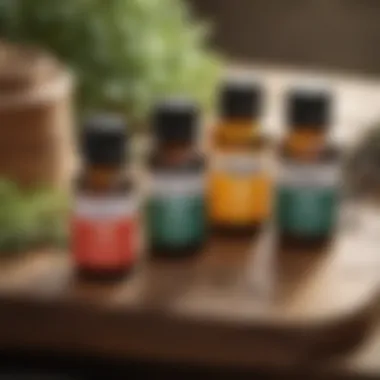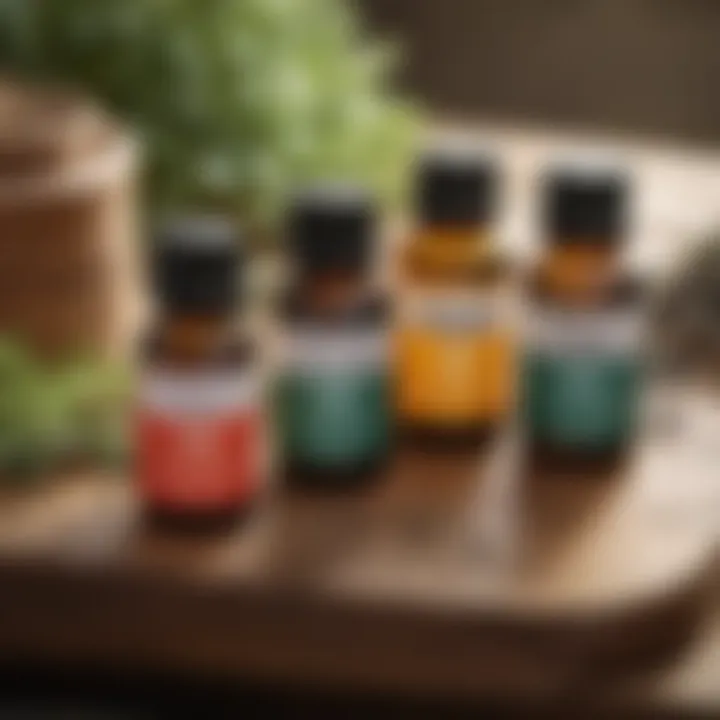Understanding What Mosquitoes Dislike: Effective Pest Management


Intro
Mosquitoes are more than just annoying summer invaders; they pose real health risks through the transmission of diseases like malaria, Zika virus, and West Nile virus. Understanding what mosquitoes dislike is crucial to effective pest management. This knowledge empowers homeowners, renters, and pest control professionals to adopt strategies that not only manage mosquito populations but also prevent their infestations. In this guide, we will explore common misconceptions and present scientifically-backed information on the habits and dislikes of mosquitoes.
Following this introduction, we will delve deeper into identifying these pests, prevention strategies that homeowners can employ, and treatment options that balance efficacy and safety. By appreciating both the biology of mosquitoes and the various deterrents available, individuals can create a more comfortable and healthier living environment.
Pest Identification
Identifying mosquitoes requires understanding their specific characteristics and distinguishing them from other insects.
Detailed descriptions of common pests
The most common type of mosquito includes the Aedes, Anopheles, and Culex species.
- Aedes: Recognizable by their white markings on legs and a characteristic lyre shape on the upper surface of their thorax, Aedes mosquitoes are known to bite during the day, especially around dawn and dusk. They are notorious for transmitting diseases like dengue and Zika.
- Anopheles: These mosquitoes are primarily active at night. They have a long, slender body and tend to be darker in color. Anopheles mosquitoes are significant because they are the primary vectors of malaria.
- Culex: Culex mosquitoes are common in suburban areas. They are typically brown and are most active during twilight hours. They can transmit West Nile and St. Louis encephalitis.
Signs and symptoms of infestations
A mosquito infestation can be identified through several signs:
- Increased mosquito bites when outdoors
- The presence of standing water in and around properties, which serves as breeding grounds
- The sighting of mosquitoes flying indoors or around windows
"Understanding mosquito behavior aids in pinpointing effective strategies for repelling them significantly."
Prevention Strategies
Once identified, it's important to take steps to prevent mosquitoes from becoming a nuisance in your living space.
Home maintenance tips for pest prevention
- Remove Standing Water: Regularly empty containers like flower pots, bird baths, and gutters that collect water.
- Modify Landscaping: Trim shrubs and maintain your lawn to reduce shaded areas where mosquitoes prefer to rest.
- Screen Doors and Windows: Ensure that all windows and doors have screens without holes. Consider investing in door sweeps to block entry.
Natural deterrents and barriers
There are multiple natural solutions that can help deter mosquitoes:
- Essential Oils: Oils such as citronella, eucalyptus, and lavender can repel mosquitoes and are often used in candles or diffusers.
- Plant-Based Barriers: Incorporating plants like marigolds, basil, and catnip around your garden can deter these pests.
- Homemade Sprays: Mixing water with essential oils can create an effective spray for use on skin or clothing.
Treatment Options
In case prevention methods fall short and you are dealing with an active infestation, various treatment options can help control the situation.
Overview of chemical vs. natural treatments
Chemical treatments often include insect repellent sprays containing DEET or picaridin. These can be effective but may also pose health risks with frequent use.
Natural treatments, including homemade sprays and essential oils, offer a safer alternative but might require more frequent application.
Step-by-step guides for DIY treatments
- DIY Mosquito Spray:
- Mosquito Traps:
- Ingredients: 1 cup of witch hazel, 2 cups of water, 20 drops of essential oil (like citronella).
- Mix all in a spray bottle and apply to exposed skin.
- Fill a bowl with sugar water and add yeast. The fermentation will produce carbon dioxide, attracting mosquitoes, and they will drown.
By understanding and utilizing the preferences and dislikes of mosquitoes, effective pest management becomes achievable and sustainable, fostering a safer home environment.
The Biology of Mosquitoes
Understanding the biology of mosquitoes is essential for effective pest management. This section will provide insights into mosquito behavior and their life cycle stages. By doing so, one can comprehend how to better repel these pests and reduce their populations. Notably, knowledge of biology often leads to strategies that are more efficient and targeted in dealing with mosquitoes.
Understanding Mosquito Behavior
Mosquito behavior plays a significant role in their attraction to humans. There are many factors that influence this behavior. For example, body heat, carbon dioxide, and even certain body odors can lure mosquitoes. Human skin emits chemicals that draw them in, and that makes understanding human-mosquito interaction vital.
Additionally, mosquitoes are more active during certain times of the day. Many species are twilight feeders, becoming active at dawn and dusk. Some prefer warmer temperatures and humid environments. This behavior underlines the importance of timing when planning outdoor activities. Reducing exposure during peak feeding times can minimize bites.
Moreover, male and female mosquitoes exhibit different behaviors. Female mosquitoes require blood for the development of eggs. This need drives them to seek hosts, while male mosquitoes primarily feed on nectar. Understanding this fundamental difference is crucial, as controlling female mosquitoes can significantly reduce populations and, subsequently, the likelihood of bites.
Life Cycle Stages
The life cycle of mosquitoes has four main stages: egg, larva, pupa, and adult. Each stage presents different opportunities for management strategies. Understanding these stages is fundamental to reducing mosquito populations effectively.
- Egg Stage: Mosquitoes lay their eggs in or near standing water. These eggs are often deposited in clusters and can withstand dry conditions for a period. If the eggs are laid in water, they hatch into larvae within a few days.
- Larva Stage: The larval stage lasts anywhere from several days to weeks, depending on environmental conditions. Larvae are aquatic and feed on organic matter in the water. Managing standing water sources can disrupt the feeding and growth of the larvae.
- Pupa Stage: After the larva stage, mosquitoes enter the pupal stage. This stage is a resting phase, and the pupae do not feed. However, they are still vulnerable. By removing breeding sites before they reach the pupal stage, the mosquito population can be significantly diminished.
- Adult Stage: The final stage is when mosquitoes become adults. They emerge from the water and begin to feed and reproduce. Adult mosquitoes can travel long distances, making it crucial to combine preventative strategies in both the home and surrounding environment.
Understanding these stages allows for the identification of key targets in controlling their population. Through careful observation and preventative actions, one can effectively manage and reduce mosquito annoyance.


The Importance of Repellents
Effective pest management largely hinges on the strategic use of mosquito repellents. This section elaborates on the critical role these products play in reducing mosquito encounters, protecting personal health, and enhancing outdoor enjoyment. A nuanced understanding of mosquito repellents can empower individuals to select the right solutions for their unique environments.
Why Mosquito Repellents Matter
Mosquito repellents serve as a frontline defense against these persistent insects. Their primary function is to mask or disrupt the cues that attract mosquitoes, including carbon dioxide and body heat released by humans. By applying these deterrents, one can significantly lower the likelihood of bites, which is vital for both comfort and health.
The benefits of repellents extend beyond just personal comfort. They also promote well-being by decreasing the risk of mosquito-borne diseases. For instance, diseases such as malaria, dengue fever, and West Nile virus are transmitted through mosquito bites. Thus, by utilizing repellents, individuals can mitigate exposure to pathogens that pose significant health risks. Moreover, using repellents aligns well with various lifestyle choices aimed at promoting well-being and safety in community environments.
In addition, certain repellents can be formulated to provide lasting protection, making them especially useful during outdoor activities like picnics or camping. Understanding how to choose the proper repellent, considering factors such as duration of efficacy and environmental conditions, enhances the effectiveness of personal protection measures.
Health Risks Associated with Mosquito Bites
The health implications of mosquito bites are far-reaching and serious. Beyond the immediate annoyance and discomfort caused by bites, various health risks are associated with these tiny insects. Mosquitoes are vectors for numerous diseases, many of which can have debilitating effects on health.
- Malaria: A life-threatening disease caused by parasites transmitted through infected mosquito bites. Symptoms include high fever, chills, and flu-like illness.
- Dengue Fever: Characterized by sudden onset fever, severe headaches, and joint discomfort. In some cases, it can progress to more lethal forms.
- Zika Virus: Mostly causes mild symptoms, but it is particularly dangerous during pregnancy as it can lead to severe birth defects.
- West Nile Virus: Typically mild but can progress to severe neurological diseases such as encephalitis or meningitis in a small percentage of cases.
Understanding these risks underscores the necessity of utilizing mosquito repellents as part of a broader strategy to safeguard health. Prioritizing effective pest management can curtail the spread of these diseases, leading to healthier communities.
"Prevention is better than cure." This age-old axiom rings especially true when addressing mosquito-borne illnesses. By investing in proper repellents today, individuals can avoid significant health challenges in the future.
In summary, choosing the right mosquito repellent is not just a matter of comfort, but a crucial aspect of public health. By recognizing the significance of repellents and the associated health risks, individuals can make informed decisions about their pest management strategies.
Natural Substances That Mosquitoes Dislike
Understanding natural substances that repel mosquitoes is essential for effective pest management. This section examines the role of essential oils and specific plants in creating a mosquito-free environment. Utilizing these natural deterrents can contribute significantly to reducing mosquito presence without relying solely on chemical options. The incorporation of these substances in gardens and home spaces offers not only effectiveness but also the added benefit of producing pleasant aromas.
Essential Oils and Their Efficacy
Essential oils provide a natural method to repel mosquitoes due to their concentrated aroma, which mosquitoes find unpleasent. Here's a look at specific oils and their characteristics:
Citronella
Citronella oil, extracted from lemongrass, is well-known for its mosquito-repelling properties. It contains compounds that mask scents that attract mosquitoes. Its popularity stems from its effectiveness and pleasant aroma. However, the unique feature of citronella is its volatility, which means it evaporates quickly. This can be seen both as an advantage and a disadvantage. While it provides immediate relief from mosquitoes, it may require frequent reapplication.
Eucalyptus
Eucalyptus oil is another strong deterrent used in many repellents. The key characteristic that stands out about eucalyptus is its strong, minty scent, which is effective in keeping mosquitoes at bay. It can serve as a beneficial option for outdoor activities. One unique feature of eucalyptus is its dual purpose; it can also provide a cooling effect on the skin. However, it’s important to use eucalyptus oil in moderation as it can cause skin irritation in some individuals.
Lavender
Lavender oil is often praised for its soothing scent. While its pleasant aroma attracts humans, mosquitoes tend to avoid it. Lavender’s calming properties make it a popular choice among enthusiasts of natural pest control. The unique feature of lavender is its versatility; it can be used in oils, sprays, or even planted in gardens. However, it might not be as powerful as other oils when it comes to repelling mosquitoes, thus requiring a combination with other repellents for greater effectiveness.
Plants That Deter Mosquitoes
In addition to essential oils, certain plants are known for their ability to repel mosquitoes. These plants can be integrated into landscaping, providing both aesthetic value and pest control benefits.
Marigolds
Marigolds release a scent that mosquitoes tend to dislike. Their bright colors also enhance garden aesthetics. One of the key characteristics of marigolds is their ability to thrive in various environments, making them an easy addition to any garden. However, while marigolds can help deter some mosquitoes, they may not be foolproof solutions on their own.
Basil
Basil is not just a culinary herb; it also serves a purpose in pest management. The pungent aroma of basil can deter mosquitoes effectively. Its key characteristic is that it is easy to grow in containers or gardens. Moreover, it can be harvested for cooking, offering a dual advantage. However, care must be taken, since it requires moist conditions to thrive and may not tolerate dry environments.
Rosemary
Rosemary is well-known for its culinary uses as well as its mosquito-deterring properties. Its woody scent is unappealing to mosquitoes. The unique feature of rosemary is its resilience; it is drought-tolerant and easy to maintain in gardens. While rosemary can help minimize mosquito presence, sufficient amounts are needed, and using it in combination with other plants may yield better results.
Chemical Repellents and Their Impact
Chemical repellents play an essential role in managing mosquito populations. They offer a reliable means to protect individuals from bites, minimizing the risk of mosquito-borne diseases. This section aims to delve into the significance of these repellents, highlighting their benefits and considerations.
The choice of a suitable repellent is crucial for effective pest management. Many individuals seek options that balance efficacy with skin safety. Chemical repellents can vary widely in their active ingredients, leading to differences in effectiveness and safety profiles. Understanding these differences allows consumers to make informed choices, ensuring that they select a repellent that aligns with both personal preferences and health considerations.
In general, chemical repellents work by masking the odors that attract mosquitoes, thereby reducing instances of bites. By comprehensively examining options like DEET and alternatives, we can better appreciate their respective roles in pest control strategies.
DEET: The Most Common Repellent
DEET is the most widely recognized chemical repellent and has been used for decades. Its primary advantage is its proven effectiveness in repelling mosquitoes. Products containing DEET provide users with long-lasting protection, often several hours, depending on the concentration. This longevity makes it a favorite among outdoor enthusiasts and those living in mosquito-prone areas.
Despite its popularity, DEET has faced scrutiny regarding safety. Some individuals may experience skin irritation or other adverse reactions. Consequently, it is vital to follow application guidelines to minimize these risks. Users should also consider the concentration level that is appropriate for their needs. Higher concentrations tend to offer longer-lasting effects but may also increase the likelihood of skin issues. Thus, assessing personal comfort and needs is essential.
Alternatives to DEET
As awareness of potential side effects increases, alternatives to DEET have gained traction. Two prominent examples are Picaridin and IR3535. These alternatives provide effective mosquito protection while addressing some of the concerns associated with traditional DEET use.
Picaridin


Picaridin is recognized for its ability to repel a wide range of insects, including mosquitoes. One of the key characteristics of Picaridin is its similarity in effectiveness to DEET but with a more favorable safety profile. Many users report that it is less likely to cause skin irritation, making it a more appealing option for those with sensitive skin.
A unique feature of Picaridin is that it does not have a strong odor, which some people find more pleasant compared to DEET. This scent-free aspect allows individuals to enjoy outdoor activities without the distinct smell often associated with traditional repellents. However, while Picaridin is effective, its duration of action may not be as long as higher concentrations of DEET. Therefore, users may need to reapply more often, especially during extended outdoor exposure.
IR3535
IR3535 stands out for its broad application in both personal and outdoor use. It is known for its efficacy as a repellent while having a low risk of skin irritation, making it suitable for various skin types. One important characteristic of IR3535 is its ability to provide protection without a strong scent, similar to Picaridin.
A unique feature to note about IR3535 is its favorable environmental impact, as it's often considered to break down more quickly in the environment compared to other chemical repellents. This aspect supports a more sustainable approach to mosquito management. However, similar to Picaridin, IR3535 may require more frequent applications to maintain its protective effects. It’s crucial for consumers to weigh the pros and cons based on their lifestyle and type of exposure.
Effective management of mosquitoes requires a nuanced approach, integrating an understanding of both chemical and natural methods. As consumers become increasingly aware of their choices, the availability of these alternatives offers a broader scope of solutions for effective pest control.
Environmental Factors That Influence Mosquito Presence
Understanding environmental factors is crucial for effective mosquito pest management. Mosquitoes thrive in specific conditions that provide suitable habitats for breeding and resting. By recognizing these factors, homeowners and renters can take steps to modify their environments, thus reducing mosquito populations around their properties.
Standing Water and Breeding Sites
One of the most significant factors influencing mosquito presence is standing water. Female mosquitoes require water to lay their eggs. They can breed in very small amounts of water, such as in clogged gutters, toys left outdoors, or even plant saucers. Eliminating these breeding sites is essential. Regularly emptying or managing standing water can drastically reduce mosquito numbers. It is beneficial to also inform neighbors about shared water sources to create a community effort in controlling the mosquito population.
Quick Tip: Regularly check and empty containers that could hold water, such as birdbaths, buckets, and garden pots. This helps interrupt the mosquito life cycle.
Weather Conditions That Favor Mosquitoes
Certain weather conditions are conducive to higher mosquito activity. Understanding these conditions is essential for proactive pest management strategies.
Humidity
Humidity plays a significant role in mosquito behavior. Mosquitoes thrive in humid environments as their bodies lose water quickly. High humidity not only affects their survival but also their ability to find hosts for feeding.
The presence of moisture in the air makes it easier for mosquitoes to reduce water loss and increases their activity levels. Moreover, humidity impacts the behavior of both female and male mosquitoes, influencing their mating and survival rates. Consequently, targeting outdoor activities during humid conditions can help reduce encounters with mosquitoes, as they are more likely to be active.
Temperature
Temperature is another critical factor influencing mosquito presence. Mosquitoes become more active as temperatures rise. Most species prefer temperatures between 70°F and 90°F to thrive.
Excessively high or low temperatures can limit their activity. For example, very cold conditions will slow down their movement, while extreme heat can dehydrate them. Therefore, understanding local temperature patterns can help residents know when to anticipate increased mosquito activity. By planning outdoor activities accordingly and making necessary preparations, it is easier to minimize interactions with these pests.
In summary, recognizing and adjusting to environmental factors such as standing water, humidity, and temperature can significantly enhance pest management strategies. Taking proactive measures based on these insights allows homeowners to create a less inviting environment for mosquitoes.
Home Remedies for Mosquito Prevention
Home remedies can play a vital role in preventing mosquito encounters. They are often easier to implement and can be more environmentally friendly than commercial alternatives. Home remedies offer the benefits of being safe, cost-effective, and accessible. They encourage individuals to use products that might already be in their homes, reducing dependence on synthetic chemicals. Moreover, these methods can provide a certain level of satisfaction from using natural solutions.
Homemade Repellent Solutions
Homemade repellent solutions are made from various natural ingredients, allowing people to create their own effective deterrents against mosquitoes. Common ingredients include essential oils such as citronella, eucalyptus, and tea tree oil. Vinegar and witch hazel are also popular choices for these mixtures.
To create a simple homemade mosquito repellent, you can mix water with one tablespoon of oil, such as peppermint, and a few drops of vinegar. This solution can then be sprayed onto the skin or surrounding area. It is important to note that while these solutions can provide some protection, their effectiveness may vary from person to person. Applying these mixtures more frequently may be necessary, as they might not offer long-lasting protection.
Physical Barriers and Their Effectiveness
Creating physical barriers is another method to reduce mosquito encounters.
Screens
Screens are an effective way to keep mosquitoes outside of homes. They can be installed on windows and doors, limiting mosquito entry. The key characteristics of screens include their fine mesh material, which acts as a barrier without obstructing airflow. This makes screens a beneficial choice in mosquito prevention, as they allow for ventilation while minimizing exposure to insects.
A unique feature of screens lies in their ability to be both durable and easy to maintain. Most screens can be washed and reused, proving cost-effective in the long run. However, regular inspections and maintenance are necessary to ensure they remain effective, as torn or damaged screens can no longer serve their purpose effectively.
Clothing Choices
Clothing choices also contribute to mosquito prevention. Wearing long sleeves and pants can provide an additional layer of protection against mosquito bites. This method relies on reducing skin exposure, thus deterring mosquitoes from landing on the skin. The key characteristic of clothing choices is their ability to effectively cover the majority of the skin, making it a straightforward and practical option for outdoor activities.
A unique feature of using proper clothing is the element of choice it offers. Individuals can select clothing made of tightly woven fabrics that mosquitoes find difficult to penetrate. However, a possible disadvantage is comfort. Wearing heavier clothing in hot weather can lead to discomfort. Balancing coverage and comfort is crucial for effectiveness.
Professional Pest Control Options
When it comes to managing mosquito populations, relying solely on home remedies or natural solutions may not always suffice. Professional pest control offers a comprehensive approach to effectively reduce and manage these pests. These services leverage specialized knowledge and techniques to target mosquito breeding sites and actively reduce their presence in and around your property. By understanding professional pest control options, homeowners can make informed decisions that enhance their overall pest management strategy.
Often, professionals have access to advanced equipment and treatment methods that are not available to the general public. For instance, they can perform thorough inspections to identify problem areas, such as standing water or dense foliage, that may harbor mosquito populations. This targeted approach is pivotal in preventing mosquitoes from becoming a persistent issue. Additionally, pest control experts can educate homeowners on preventative measures that can be taken moving forward, addressing not only current infestations but also reducing the risk of future outbreaks.
There are many benefits to engaging professional pest control services:
- Expertise: Trained professionals have extensive knowledge about mosquito behavior and biology.
- Efficient Treatment: Advanced techniques and products yield faster, more effective results.
- Safety: Professionals use treatments that are safe for humans and pets, applied in a controlled manner.
- Long-Term Solutions: Professionals often provide ongoing maintenance plans to ensure mosquitoes are managed year-round.
In summary, leveraging professional pest control services can substantially enhance your ability to manage mosquitoes effectively, making it a worthwhile consideration for homeowners facing significant mosquito challenges.


When to Seek Professional Help
Deciding when to involve a pest control professional can be quite challenging. Not all mosquito issues require expert intervention. However, certain scenarios may necessitate professional assistance:
- High Mosquito Populations: If mosquitoes are overwhelming, with numerous bites occurring even when outside, it may be time to consult a professional.
- Persistent Infestations: If home remedies and preventive measures have failed to reduce mosquito populations, professional help might be necessary.
- Breeding Sites: If there are significant water sources around your property that attract breeding, expert intervention can help address these areas more effectively.
- Health Concerns: If you or family members have health conditions that increase risks from mosquito bites, like allergies or weakened immune systems, it is prudent to seek professional help immediately.
In such cases, taking action can prevent the issue from worsening and lead to a safer environment for everyone.
Chemical Treatments and Their Effectiveness
Chemical treatments remain a popular option in professional pest control for managing mosquito populations. These treatments involve using insecticides that are specifically formulated to target mosquitoes without affecting other wildlife or pets. However, it's crucial to understand the balance between effectiveness and safety.
Common chemical treatments include:
- Adulticides: These are designed to eliminate adult mosquitoes upon contact. Their application can provide immediate relief from high populations.
- Larvicides: Targeting the larval stage, these chemicals prevent young mosquitoes from maturing. This can significantly reduce future populations.
Effectiveness can vary based on several factors, including:
- Application Method: Proper application technique is critical to ensure the chemicals reach targeted areas effectively.
- Timing: Treatments should be applied during peak mosquito activity for maximum impact.
- Environmental Conditions: Wind, rain, and temperature can influence the efficacy of chemical treatments.
While chemical treatments can provide fast results, they are best used as part of a broader integrated pest management strategy. This ensures long-term control while minimizing environmental impact. For the best results, ongoing consultation with pest control professionals is advantageous, allowing adjustments based on conditions and efficacy over time.
"Professional intervention is often the key to effective mosquito management, paving the way for a more enjoyable outdoor experience."
Behavioral Adjustments to Reduce Mosquito Encounters
Understanding mosquitoes' behaviors can be vital in reducing encounters with these pests. Behavioral adjustments represent practical strategies individuals can adopt to shield themselves effectively from mosquito bites. They are simple yet impactful modifications to daily routines and living environments, focusing on timing outdoor activities and maintaining a well-kept yard.
Not only do these adjustments lower the chances of being bitten, but they also contribute to a broader effort of sustainable mosquito management. Homeowners can create a more comfortable outdoor space while minimizing the reliance on chemical repellents. Keeping this in mind encourages thoughtful consideration of how human activities influence mosquito presence.
Timing of Outdoor Activities
Choosing appropriate times for outdoor activities is essential in reducing mosquito bites. Mosquitoes are most active during dawn and dusk, making these periods prime time for potential encounters. By strategically planning outdoor activities outside of these peak hours, individuals can significantly minimize their risk of being bitten.
Opting for midday outdoor events can be a wiser choice. The heat of the sun tends to reduce mosquito activity, providing a more pleasant and bite-free experience. Therefore, if you enjoy evening strolls or backyard gatherings, consider shifting your schedule to earlier in the day or during the lunch hour.
Proper Yard Maintenance
Maintaining your yard effectively is another critical aspect of mosquito management. Standing water is a known breeding ground for mosquitoes, so regular inspections of your property are advisable. Homeowners should remove any sources of stagnant water, such as bird baths, clogged gutters, or old tires.
Beyond managing water sources, keeping a tidy yard can also help deter mosquitoes. Here are some practical tips for yard maintenance:
- Trim shrubs and bushes: Overgrown plants can provide shade, creating ideal resting spots for mosquitoes.
- Mow the lawn regularly: Long grass may trap moisture and attract mosquitoes, so maintaining a short lawn can help.
- Clear debris: Remove leaves and other organic matter that may hold water and create breeding sites.
By adopting these behavioral adjustments in outdoor living, individuals can create a more comfortable and enjoyable environment, effectively reducing encounters with mosquitoes.
Myths and Misconceptions About Mosquitoes
Understanding the myths and misconceptions about mosquitoes is crucial for anyone who seeks to manage these pests effectively. Many individuals hold beliefs that do not align with scientific fact, leading to ineffective control measures. This section will clarify some of the most common myths and reveal the realities behind them. By debunking these misconceptions, homeowners can adopt more effective strategies and make informed choices regarding pest management.
Debunking Common Myths
- Myth: Mosquitoes Always Bite Only at Night
Reality: While many species are predominantly nocturnal, several types are active during the day. Species such as Aedes aegypti can bite in the early morning and late afternoon, making it essential to apply preventive measures at all times. - Myth: Dark Clothing Attracts Mosquitoes
Reality: Although dark colors can make you more visible, the primary factors that attract mosquitoes are carbon dioxide and body heat. They are more drawn to the scent of sweat and certain chemicals found in our skin. - Myth: Mosquitoes Prefer Certain Blood Types
Reality: Studies have indicated that some mosquitoes are more attracted to certain blood types, but they do not discriminate solely based on blood type. Instead, they react more to individual body chemistry and odors. - Myth: Mosquitoes Are Only a Nuisance
Reality: Beyond the itchiness of bites, mosquitoes can transmit serious diseases such as Zika virus, West Nile virus, and malaria. It is critical to take bites seriously and implement preventive strategies.
These myths can lead to neglecting effective measures and ultimately decrease the ability to protect against mosquito bites. Clearing up these misconceptions can empower readers to engage in useful pest management practices.
Understanding Mosquito Attraction Factors
To efficiently repel mosquitoes, it's important to understand what truly attracts them. Several factors play a role in drawing mosquitoes to humans and habitats:
- Carbon Dioxide
Mosquitoes have specialized receptors that detect carbon dioxide from our breath. Since humans exhale this gas, it becomes an attractive signal, especially for hungry female mosquitoes that seek a blood meal. - Body Heat and Sweat
Mosquitoes can locate their hosts by sensing heat emitted from our bodies. Additionally, the lactic acid and ammonia present in sweat can also lure them in. This is why physical activity often leads to more bites. - Body Odor
Each person has a unique body odor, comprised of a mixture of bacteria and natural skin oils. Some compounds such as octenol or hexanoic acid are particularly appealing to mosquitoes. Certain perfumes and scented lotions can also enhance our attractiveness to these pests. - Other Environmental Factors
Standing water, warm temperatures, and humidity create ideal breeding and feeding conditions for mosquitoes. Keeping yards clean and free from stagnant water is vital.
Understanding these attraction factors is crucial. Eliminating breeding sites and reducing personal attractiveness will lead to more effective mosquito management.
By comprehending the realities of mosquito behavior and attraction, housewives and homeowners can better equip themselves against these pests, ensuring a more pleasant and healthy living environment.
Future Trends in Mosquito Management
Mosquito management continues to evolve, driven by new findings and technology. It is very important for both individuals and communities. Understanding these trends can significantly enhance the effectiveness of pest control efforts. By exploring innovative solutions and taking sustainability into consideration, pest management can lead towards a more balanced approach to combating mosquitoes while minimizing environmental impact.
Innovative Solutions in Pest Control
Recent advancements in technology and science have opened up new avenues for mosquito control. For instance, genetically modified mosquitoes are being tested in various regions. These modified mosquitoes can reduce the population of carriers like Aedes aegypti, known for spreading diseases such as Zika and dengue fever. This method shows promise but raises questions about ecological balance. Another noteworthy innovation is the use of drones for aerial spraying, which can cover large areas efficiently.
Furthermore, the application of artificial intelligence in tracking mosquito behavior is becoming popular. Smart traps equipped with sensors can identify the type of mosquito and even the number in a specific area. This data can inform targeted control measures, reducing the use of broad pesticides. Additionally, researchers are developing biocontrol methods, which utilize natural predators to manage mosquito populations.
Sustainability Considerations in Mosquito Control
Sustainability is a crucial aspect of future mosquito management strategies. As concerns over pesticide use increase, the focus shifts to eco-friendly alternatives. Integrated Pest Management (IPM) is gaining traction. This approach combines various control methods, allowing for effective mosquito population management while lessening the reliance on harmful chemicals.
Planting native species that deter mosquitoes can contribute to a healthier ecosystem. Certain plants, like citronella and lemongrass, serve dual purposes: repelling mosquitoes and enhancing garden aesthetics. Promoting biodiversity also supports natural mosquito predators, further controlling populations naturally.
"Sustainable practices in mosquito control not only protect public health but also preserve the environment for future generations."
In summary, staying informed about future trends in mosquito management is beneficial. Understanding and adopting innovative solutions can lead to effective pest control, while a focus on sustainability ensures that these methods are environmentally sound.



